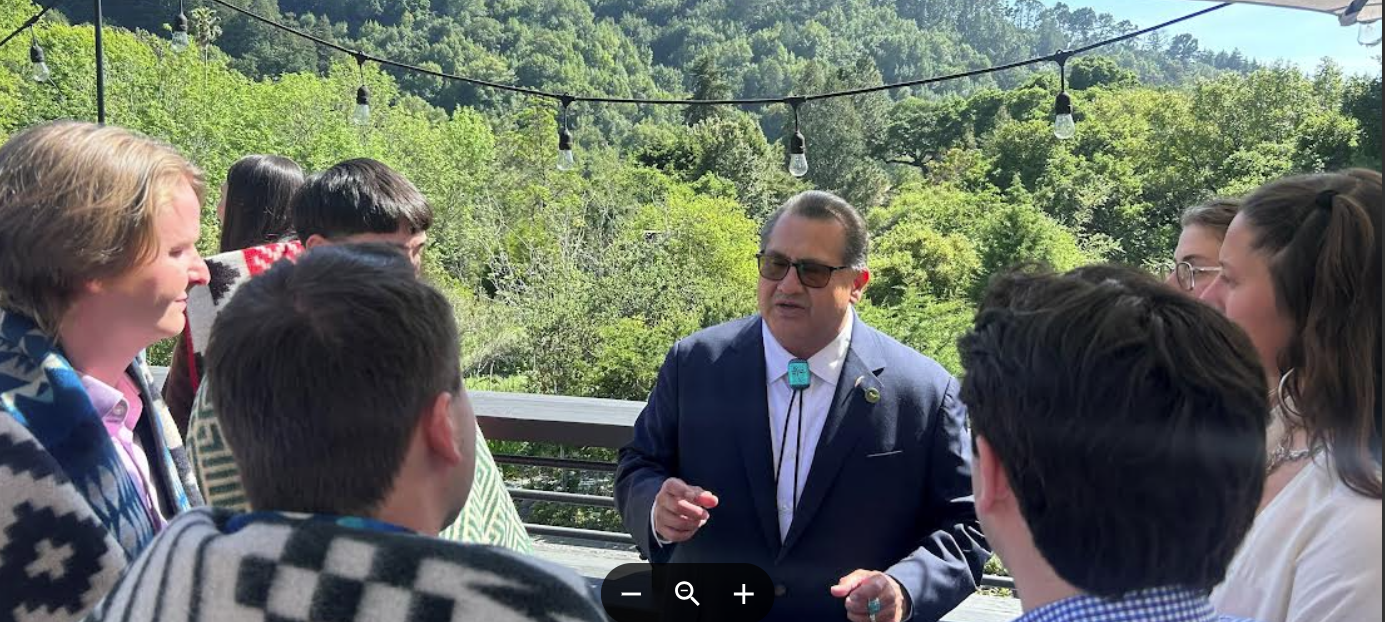
- Details
- By Native News Online Staff
The University of California, Berkeley School of Law’s Native American Law Student Association (NALSA) recently honored Assemblymember James C. Ramos (D-Highland) and his wife of 36 years, Terri Ramos, at its 2025 Honoring Ceremony. The couple was recognized for their enduring contributions and leadership in Native American communities.
Merri Lopez-Keifer, Executive Director of the Center for Indigenous Law & Justice, praised Terri Ramos for her unwavering support. “Terri Ramos was honored for her steadfast support of her family and community. As the partner of a tribal leader and legislator, her quiet strength underscores that leadership often happens in everyday acts of care and resilience,” she said.
 Make A Donation Here
Make A Donation Here
Assemblymember Ramos delivered the keynote address at the UC Botanical Garden, where he stressed the importance of defending tribal sovereignty and promoting Native self-determination. His speech reflected on historical challenges while also focusing on ongoing legislative efforts.
The event, hosted by the Center for Indigenous Law & Justice, also celebrated this year’s NALSA graduates: Mackenzie Gettel (Iowa Nation), Dylan Good (Maidu), Grace Li (Modoc Nation Descendant), Robin Martinez (Navajo), Joseph Ross (Cherokee Nation), Washakie Tibbetts (White Earth Ojibwe & Wind River Shoshone), and Lucas White Moon (Gros Ventre). Family, friends, and community members joined in the celebration.
More Stories Like This
Native Students Can Win $5,000 Scholarship, International Distribution in Pendleton Design ContestAmerican Indian College Fund Raises Alarm Over Plan to Shift Native Programs Away From the Dept. of Education
MacKenzie Scott Foundation Gives $5 Million Contribution to Little Priest Tribal College
Tribal Leaders Push Back on Dismantling of U.S. Department of Education
American Indian College Fund Names 12 Student Ambassadors for 2025–26
Help us defend tribal sovereignty.
At Native News Online, our mission is rooted in telling the stories that strengthen sovereignty and uplift Indigenous voices — not just at year’s end, but every single day.
Because of your generosity last year, we were able to keep our reporters on the ground in tribal communities, at national gatherings and in the halls of Congress — covering the issues that matter most to Indian Country: sovereignty, culture, education, health and economic opportunity.
That support sustained us through a tough year in 2025. Now, as we look to the year ahead, we need your help right now to ensure warrior journalism remains strong — reporting that defends tribal sovereignty, amplifies Native truth, and holds power accountable.
 The stakes couldn't be higher. Your support keeps Native voices heard, Native stories told and Native sovereignty defended.
The stakes couldn't be higher. Your support keeps Native voices heard, Native stories told and Native sovereignty defended.
Stand with Warrior Journalism today.
Levi Rickert (Potawatomi), Editor & Publisher

